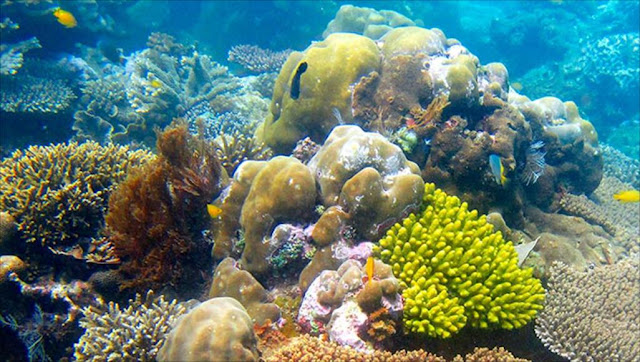The beautiful turquoise waters of the Caribbean Sea, Pacific Ocean and other oceans have become popular destinations for diving and snorkeling due to the diversity of fish and coral reefs in those areas.
So What Is Coral?
Coral is an organism that may be hard or soft and the coral reefs that we see in the oceans are formed by migratory groups or colonies of small organisms called (Coral polyps) which are a distant relative of the lamp and marine anemones, the hard coral is formed when extracting some of these Coral polyps of calcium from seawater and convert them to external limestone stone shelters, while others convert calcium to internal structures to produce soft corals, and when many colonies of coral polyps converge to create a large habitat we call corals.
Coral reefs not only attract diverse and divers, they also support marine biodiversity in the world and while covering an area of less than 1% of the Earth's surface it is necessary for more than 500 million people who depend on them for food, work, and recreation with economic returns estimated at about 375 billion dollars American a year.
Therefore, the question, “What if?” It is a scenario that is not very unlikely. The risks surrounding coral and coral reefs that include (climate change, pollution, coastal development, fishing and jewelry making, and souvenirs) are truly occurring. To 8% of all coral reefs, while they were over 50% in the 1970s.
So What If the Reefs Have Completely Died Out?

Experts expect an increase in the rates of hunger, poverty, and political instability due to the interruption of the livelihoods of whole countries. When the coral dies, the reef will die and erode, and important ground for ovulation and nourishment will be destroyed for marine life. snapper), oysters and clams will thus be negatively affected, and since this marine life is essential in the diet of many peoples, the death of coral reefs will exacerbate the problem of feeding these groups.
The ocean fishing profession occupied by 38 million people around the world will collapse, while the peoples of the Caribbean islands that depend on the returns of tourism and recreation will disappear, and finally the global health will deteriorate throughout the world and not only in the bifurcation areas, as coral is involved in many pharmaceutical industries.
These are some of the results that scientists can predict in the short term and there is much that they cannot predict if coral reefs disappear. The food chain and biodiversity imbalance may lead to additional problems that we cannot fully understand.
There are some measures we can take to help preserve coral reefs, many of which have other environmental benefits such as relying on alternative means of transportation such as walking and cycling, which limits the use of pollutants such as oil and gas, volunteering in beach and reef cleaning organizations and reducing the use of pesticides or chemical fertilizers. That might end up in the ocean.
With a little awareness and commitment to what our consciences dictate to us, we can help preserve coral and biodiversity for the benefit of future generations.


No comments:
Post a Comment